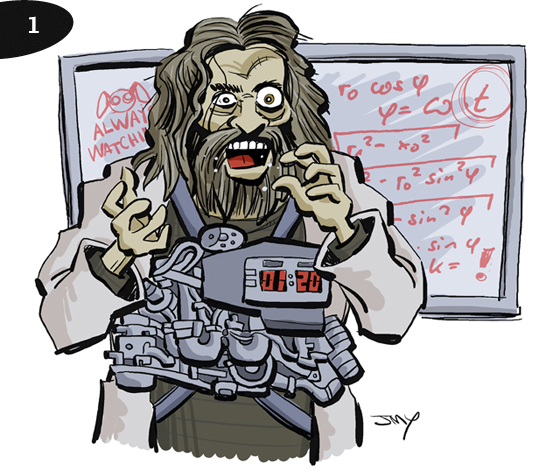
You find yourself lying chin-down on a threadbare rug in an unfamiliar room. Slowly, the fog in your head starts to lift. You glance around to see a bearded, wild-eyed man with about twenty pounds of cobbled-together machinery strapped to his chest. He’s working at a whiteboard frantically, rubbing out sections with his fist and filling in new numbers with a dry-erase marker. The year, if everything has gone as planned, should be 1983. And it’s a pretty safe bet that this guy is your mission objective.
Your ears perk up and you absentmindedly scratch your neck with a hind leg. We should mention at this point that you’re currently inhabiting the body of a Labrador retriever.
The Time Travel Investigation Agency might sound like an exciting place to work, but you’ve learned that the actual business of time travel investigation is unbelievably dull. There are several hard-and-fast physical laws that govern time travel, and those laws tend to make quantum exploration a remarkably boring affair.
First: you can’t travel to any period before November 5, 1931—presumably the date that time travel was invented. This puts some fairly severe limits on time travel as a means to clarify the historical record. You also can’t visit any date after August 12, 2271, although nobody knows why (no investigator who looked into it has ever returned to file a report, which tends to discourage further study).
Second: you can’t send physical matter through time, so your actual body doesn’t make the trip. You can only transfer your consciousness into a body that already exists in the targeted time period—it’s called the Bakula Principle. If your own body is alive and well at whatever age, you’ll automatically snap into it, but if you travel before your birth or after your death, you can float around a bit and select a convenient host. Which explains the Labrador retriever. It also explains how a recent college graduate like yourself got hired as a Time Travel Investigator—the fewer years you’ve been alive, the more years you have to travel the timestream freely without being pulled into a younger version of yourself.
Third: the whole idea that you can alter the past is a fantasy, since alternate timestreams would break Einstein’s theory of relativity. There’s only one reality, so if you travel back in time and accomplish anything at all, that action is already part of history before you get there. Your boss, Professor Venkataraman, insists that this doesn’t necessarily prove all human decisions are predestined, but the subtleties are lost on you. What it definitely means is that no one can go back in time and stop Hitler (though many have tried) or accidentally screw up the past.
All of this, in turn, would seem to mean that your job is largely pointless.








